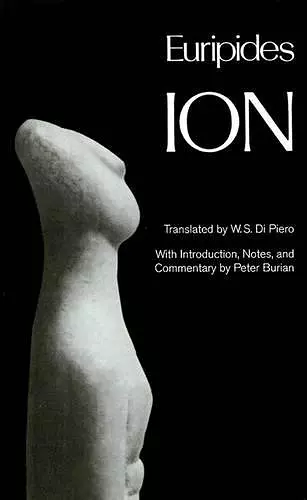Ion
Euripides author W S Di Piero translator Peter Burian editor
Format:Paperback
Publisher:Oxford University Press Inc
Published:3rd Oct '96
Currently unavailable, and unfortunately no date known when it will be back

One of Euripides' late plays, Ion is a complex enactment of the changing relations between the human and divine orders and the way in which our understanding of the gods is mediated and re-visioned by myths. The story begins years before the play begins, with the rape of the mortal Kreousa, queen of Athens, by Apollo. Kreousa bears Apollos' child in secret then abandons it. Unbeknownst to her, Apollo has the child brought to his temple at Delphi to be reared by the priestess as ward of the shrine. Many years later, Kreousa, now married to the foreigner Xouthos but childless, comes to Delphi seeking prophecy about children. Apollo, however, speaking through the oracle, bestows the temple ward, Ion, on Xouthos as his child. Enraged, Kreousa conspires to kill as an interloper the very son she has despaired of finding. After mother and son both try to kill each other, the priestess reveals the birth tokens that permit Kreousa to recognize and embrace the child she thought was dead. Ion discovers the truth of his parentage and departs for Athens, as a mixed blood of humanity and divinity, to participate in the life of the polis. In Ion, disturbing riptides of thought and feeling run just below the often shimmering surfaces of Euripidean melodrama. Although the play contains some of Euripides' most beautiful lyrical writing, it quivers throughout with near disasters, poorly informed actions and misdirected intentions that almost result in catastrophe. Kreousa says at one point that good and evil do not mix, but Euripides' argument, and what the youthful Ion strives to understand, is that human beings are not only compounded of good and evil, but that the two are often the same thing differently experienced, differently understood, just as beauty and violence are mixed both in the gods and in the mortal world.
"A comprehensive introduction by Peter Burian explores major themes and structures."--Publishers Weekly "A very readable and passionate translation. Euripides' pathos comes out well."--Clifford Broenimur, University of Massachusetts at Amherst "Thanks for an excellent version of this important text."--Professor David Hopes, UNCA "Euripedes' Ion has much to recommend it to today's reader or dramatic producer....Ion can be used in myth-courses (an excellent text on Apollo), drama-in-translation courses, and also women-in-antiquity courses, since Kreousa exemplifies in miniature the plight of ancient women....The new addition to the Greek Tragedies in New Translatioins...presents a marvellously balanced introduction to the play."--Bryn Mawr Classical Review "A comprehensive introduction by Peter Burian explores major themes and structures."--Publishers Weekly "A very readable and passionate translation. Euripides' pathos comes out well."--Clifford Broenimur, University of Massachusetts at Amherst "Thanks for an excellent version of this important text."--Professor David Hopes, UNCA "Euripedes' Ion has much to recommend it to today's reader or dramatic producer....Ion can be used in myth-courses (an excellent text on Apollo), drama-in-translation courses, and also women-in-antiquity courses, since Kreousa exemplifies in miniature the plight of ancient women....The new addition to the Greek Tragedies in New Translatioins...presents a marvellously balanced introduction to the play."--Bryn Mawr Classical Review
ISBN: 9780195094510
Dimensions: 203mm x 135mm x 6mm
Weight: 136g
112 pages